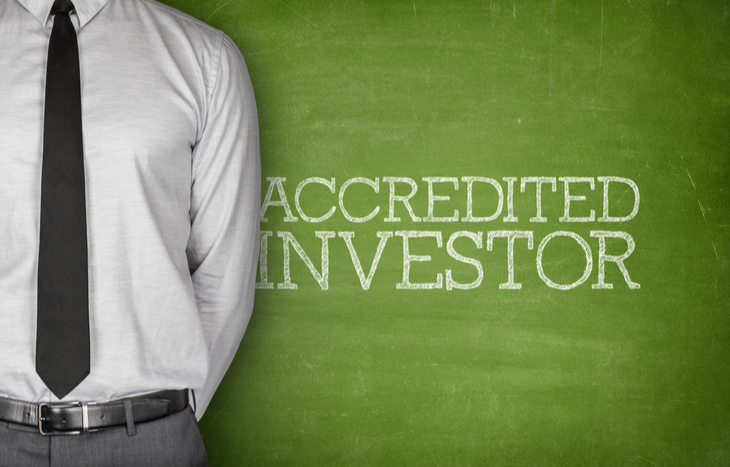How to Become an Accredited Investor: A Comprehensive Guide

Learning how to become an accredited investor will allow you access to certain types of investments not available to the general public. This is because the Securities and Exchange Commission (SEC) does not require companies to register certain investments as long as these assets are sold to accredited investors.
However, the SEC determines the requirements and be eligibility for these opportunities. So, learning how to become an accredited investor begs the question – what is an accredited investor?

What is an Accredited Investor?
An accredited investor meets certain criteria regarding income, net worth or other qualifications. Investors with accredited status may invest directly in unregistered securities not available to the general public. This includes…
- Hedge funds
- Venture capital funds
- Private equity deals
- Equity crowdfunding
- Angel investing
- Other private placements
An accredited investor is a person or entity allowed to invest in securities that aren’t registered with the SEC. A typical investor may be familiar with securities like stocks, bonds and mutual funds. However, the SEC views products like hedge funds as completely different. As a result, investors need to demonstrate that they understand the risks connected to these investments.
To be an accredited investor, an individual or entity must meet certain income and net worth guidelines.
How to Become an Accredited Investor: Requirements
According to Regulation D of the Securities Act of 1933, an accredited investor must meet certain criteria. Simply put, the SEC defines it in a few different ways:
- In the two years preceding the application, an investor must have earned income exceeding $200,000 ($300,000 with combined earnings with a spouse). Also, the individual must demonstrate that he or she is capable of maintaining the above income thresholds during the current year.
- The net worth of an individual must be at least $1 million, minus the value of his or her primary residence.
- Individuals who have certain professional certifications, designations or credentials (series 7, series 65 and series 82 licenses).
- Individuals who are “knowledgeable employees” of a private fund.
To verify an individual’s accreditation status, firms selling unregistered products conduct their own screening processes. So, how do companies determine if you’re an accredited investor?
How to Prove You’re an Accredited Investor
Most people have the misconception that becoming an accredited investor requires a traditional process. However, the credentials of an investor are not reviewed by government agencies or independent bodies. Moreover, no accreditation exam or certificate exists.
You are not directly responsible for proving you are an accredited investor. Instead, the provider of the unregistered security you wish to invest in is. The security, such as a fund, would need to determine whether you are accredited before you can invest.
Let’s say that you’re interested in investing in an unregistered fund. To determine if you’re an accredited investor, the management firm may screen you. It may begin with handing you a questionnaire to determine your qualifications. As part of the evaluation process, you may also have to provide one or more of the following:
- Financial statements and details of other accounts
- Credit report for confirming an individual’s net worth
- Tax returns
- W-2 forms and other documents indicating earnings
- “Knowledgeable employees” of the issuing fund
- Professional certifications, designations or credentials administered by Financial Industry Regulatory Authority (FINRA). This includes FINRA’s Series 7, Series 65 or Series 82 designations.
To prove someone is an accredited investor, firms often use different methods and documentation. So, there’s no black and white method on how to determine if you’re an accredited investor.
Once you pass the criteria and learn how to become accredited, you may be jumping at opportunities to invest in unregistered securities. However, there are some pros and cons to consider…
Pros and Cons of Being an Accredited Investor
Keep Reading This Article and Find Out the Pros and Cons of Being an Accredited Investor!
Enter your email below to read the reveal the pros and cons of being an accredited investor.
You’ll also be opted in to receive our free daily e-letter, Investment U, where you’ll find expert investment insight, analysis and stock picks for all the best investment opportunities.
Nunc ut lorem quis urna auctor ornare quis in sem. Donec sodales viverra ante, et scelerisque libero iaculis sit amet. Phasellus fermentum vitae tellus quis suscipit. Ut bibendum aliquet odio, a venenatis augue fermentum at. Nunc fringilla dui lorem, congue blandit ex egestas in. Vestibulum dapibus orci ut felis consequat euismod. Sed pretium, risus vel blandit porttitor, diam diam sodales dui, in lobortis lorem ex vitae est. Nullam ac venenatis massa. Integer blandit, diam et fringilla semper, nulla dui suscipit urna, eget hendrerit quam ex rutrum tellus. Nam imperdiet, nibh nec mollis vulputate, felis ante posuere leo, at ultrices nulla neque vitae mi.Nunc ut lorem quis urna auctor ornare quis in sem. Donec sodales viverra ante, et scelerisque libero iaculis sit amet. Phasellus fermentum vitae tellus quis suscipit. Ut bibendum aliquet odio, a venenatis augue fermentum at. Nunc fringilla dui lorem, congue blandit ex egestas in. Vestibulum dapibus orci ut felis consequat euismod. Sed pretium, risus vel blandit porttitor, diam diam sodales dui, in lobortis lorem ex vitae est. Nullam ac venenatis massa. Integer blandit, diam et fringilla semper, nulla dui suscipit urna, eget hendrerit quam ex rutrum tellus. Nam imperdiet, nibh nec mollis vulputate, felis ante posuere leo, at ultrices nulla neque vitae mi.
Integer blandit, diam et fringilla semper, nulla dui suscipit urna, eget hendrerit quam ex rutrum tellus. Nam imperdiet, nibh nec mollis vulputate, felis ante posuere leo, at ultrices nulla neque vitae mi.Nunc ut lorem quis urna auctor ornare quis in sem. Donec sodales viverra ante, et scelerisque libero iaculis sit amet. Phasellus fermentum vitae tellus quis suscipit. Ut bibendum aliquet odio, a venenatis augue fermentum at. Nunc fringilla dui lorem, congue blandit ex egestas in. Vestibulum dapibus orci ut felis consequat euismod. Sed pretium, risus vel blandit porttitor, diam diam sodales dui, in lobortis lorem ex vitae est. Nullam ac venenatis massa. Integer blandit, diam et fringilla semper, nulla dui suscipit urna, eget hendrerit quam ex rutrum tellus. Nam imperdiet, nibh nec mollis vulputate, felis ante posuere leo, at ultrices nulla neque vitae mi.
The Bottom Line on How to Become an Accredited Investor
Several non-registered investments are available to accredited investors, including private equity funds, hedge funds, angel investments, venture capital firms and other securities.
Accredited investors can take advantage of these vehicles for high returns and other benefits. Despite their advantages, they also have significant drawbacks, including high risk and high minimum investments. So, it’s wise to consult a financial advisor before investing in this section of the investing world.
As a result of SEC regulations, companies must take several steps to verify the accredited status of investors. You can build wealth in a short period of time if you qualify as an accredited investor.
However, you still have access to a vast array of investment opportunities if you don’t qualify for accredited investor status. A variety of options are available to you, including equities, bonds, and real estate.






